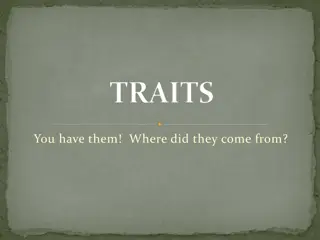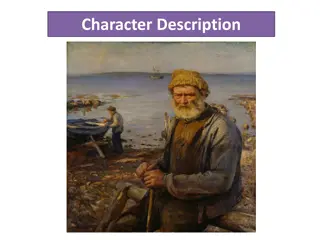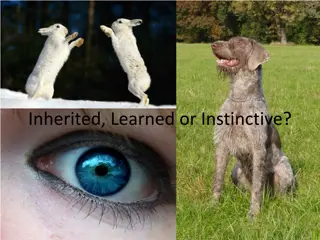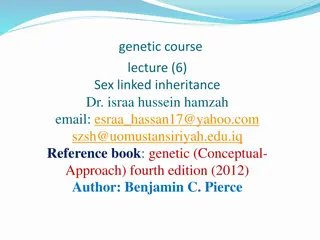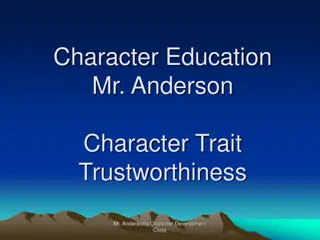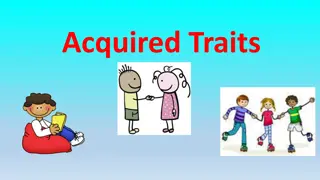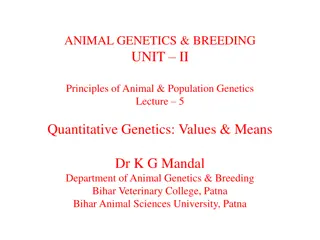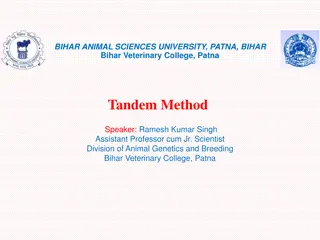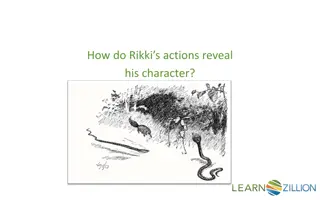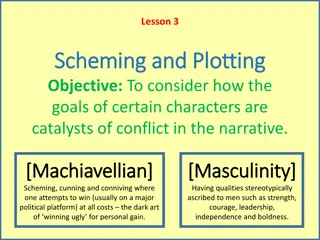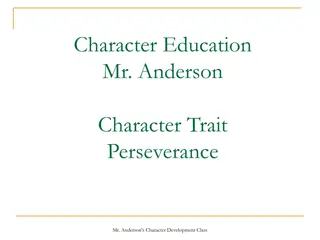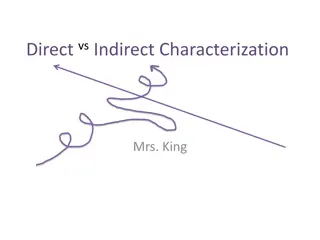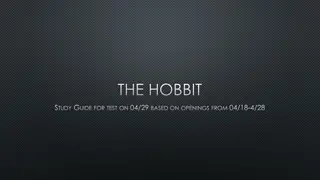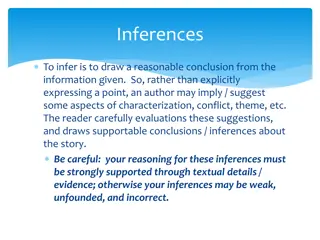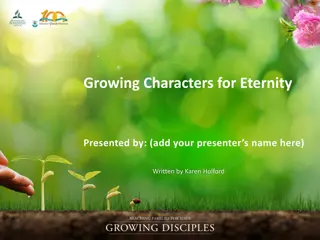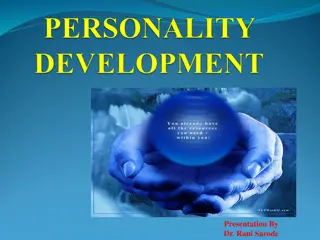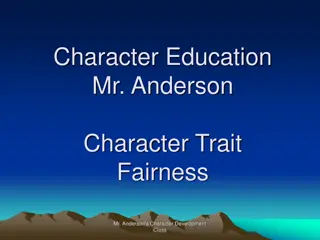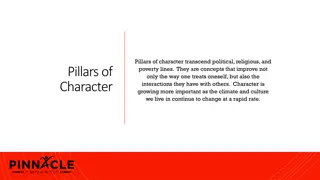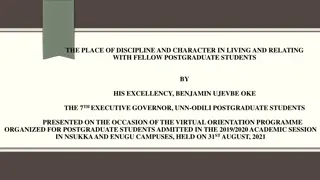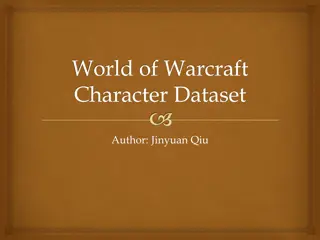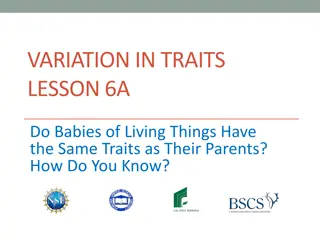Character Analysis in Ben Johnson's "Volpone
Character analysis of key characters in Ben Johnson's play "Volpone" including Corbaccio, Voltore, Mosca, and Volpone. Each character is dissected based on their traits, motivations, and role in the intricate plot, showcasing their unique personalities and flaws. The analysis delves into the spiritu
0 views • 9 slides
Unraveling the Mystery of Traits and Genes
Explore the fascinating world of traits and genes, understanding how they are passed down from parent to offspring through chromosomes. Delve into the role of genes in controlling various traits such as hair color, eye color, and even unique characteristics like detached earlobes and widow's peak. D
2 views • 11 slides
Mastering Character Descriptions: Show, Don't Tell Techniques
Enhance your character descriptions by utilizing language devices such as similes, metaphors, alliteration, verbs, adjectives, and adverbs. Learn how to show rather than tell by using vivid descriptions and unique synonyms. Understand how readers infer character traits through details like name, age
0 views • 11 slides
Inherited, Learned, and Instinctive Traits in Organisms
Traits in organisms can be inherited, learned, or instinctive. Inherited traits are genetic and include characteristics like hair color and disease predispositions. Instinctive traits are inherent behaviors such as sleeping and grooming. Learned traits are behaviors acquired for survival, like house
0 views • 20 slides
Sex-Linked Inheritance: Key Concepts and Examples
Sex-linked inheritance refers to the transmission of genetic traits determined by genes located on the sex chromosomes. This type of inheritance differs from autosomal inheritance due to the unique characteristics of the X and Y chromosomes. In organisms with XX/XY sex determination, genes on the X
3 views • 21 slides
Mr. Anderson's Character Development Class
Explore the key character traits of trustworthiness, loyalty, and integrity in Mr. Anderson's Character Development Class. Understand the definitions, examples, and associated words of these qualities to cultivate a strong moral foundation. Dive into the importance of honesty, reliability, responsib
0 views • 25 slides
Evolution of Directions on Good Character in Legal Proceedings
The significance of providing good character directions in legal proceedings has evolved over time, progressing from being discretionary to mandatory in certain situations. This presentation delves into the historical development of allowing evidence of good character, the definition of character in
2 views • 33 slides
Contrasting Qualitative and Quantitative Traits in Genetics
Genetic traits in organisms can be qualitative or quantitative, with qualitative traits controlled by single genes and showing distinct variations, while quantitative traits are influenced by multiple genes and environmental factors, resulting in continuous variations. Qualitative genetics focuses o
1 views • 13 slides
Acquired Traits and Learned Behaviors in Living Organisms
Acquired traits are physical characteristics acquired during a living thing's lifetime, such as scars, and are not passed down from parents. Many acquired traits are also learned behaviors, like reading or flying, which animals develop after birth. Learned behaviors, unlike inherited instincts, are
5 views • 15 slides
Quantitative Genetics Principles in Animal Breeding
Quantitative genetics focuses on the inheritance of characteristics based on degree rather than kind, compared to qualitative genetics. It involves polygenes controlling quantitative traits, which exhibit continuous variation and can be measured using metric units. Qualitative traits, on the other h
1 views • 22 slides
Tandem Method in Animal Breeding: Sequential Traits Selection
Tandem method in animal breeding involves selecting useful traits sequentially to improve genetic performance. Breeders focus on one trait until a desired level is achieved before moving on to the next trait. While effective in targeted improvement, the method can lead to loss of previously improved
0 views • 6 slides
Analyzing Rikki's Actions to Reveal His Character Traits
Explore Rikki's actions in the story of "Rikki-Tikki-Tavi" to uncover his character traits. By listing and analyzing his behaviors, such as playfulness, curiosity, and bravery, discover how his actions shape his personality and motives throughout the narrative.
0 views • 12 slides
Nurturing Character Education in Primary Schools
Explore the importance of character education in primary schools as a tool for developing virtues and instilling values. Learn about key approaches, virtues taught, and the Caterpillar Process for fostering self-awareness and positive character traits in young students.
0 views • 15 slides
Effective Church Councils Training: Character Traits & Operational Values for Leaders
Explore the significance of character traits and operational values for church council members, setting the course for a healthy, life-giving congregation. Learn about the pivotal roles and responsibilities of deacons and elders, emphasizing competencies, character, calling, and core values essentia
3 views • 19 slides
Character Traits Analysis in "The Scarlet Letter
The character traits of Hester, Pearl, Roger Chillingworth, and Rev. Arthur Dimmesdale from Nathaniel Hawthorne's novel "The Scarlet Letter" are explored through adjectives and quotes. Each character exhibits a unique blend of qualities such as beauty, independence, vengefulness, and guilt, shaping
0 views • 23 slides
Analyzing Masculinity and Machiavellian Tactics in "Macbeth": Character Dynamics and Plot Development
Explore the themes of masculinity and Machiavellianism in Shakespeare's "Macbeth" through character analysis of Lady Macbeth and Macbeth himself. Delve into the scheming and plotting that drive conflicts as characters navigate personal agendas and political ambitions, culminating in Lady Macbeth per
0 views • 10 slides
Mr. Anderson's Character Development Class - Perseverance and Tenacity
Explore the theme of perseverance and tenacity in Mr. Anderson's Character Development Class. Dive into the definition, examples, related words, and a story about the Crow and the Pitcher that highlight the importance of these character traits. Engage with thought-provoking questions on patience and
0 views • 26 slides
Direct vs. Indirect Characterization in Storytelling
Characterization is key in storytelling to develop characters effectively. Direct characterization involves explicitly stating a character's traits, while indirect characterization reveals traits through actions, thoughts, and interactions. Examples illustrate the difference between the two methods,
0 views • 15 slides
The Hobbit Study Guide: Character Traits, Figurative Language, and Sentence Structures
Explore the character traits of Bilbo Baggins and the dwarves, delve into figurative language examples, and learn about sentence structures in "The Hobbit" through this comprehensive study guide for an upcoming test.
0 views • 7 slides
Foils in Literature and Media
A foil is a character in a story that contrasts with another character, often the protagonist, to highlight their qualities. It can be completely opposite or similar with a key difference. Foils are used to emphasize specific traits of the main character without being the antagonist. Examples of foi
0 views • 10 slides
Character Traits and Types in Literature
Character traits in literature help define and understand characters, with internal qualities shaping external behaviors. Authors can teach readers about characters through actions, descriptions, speech, interactions, and judgments. Characters can be round (dynamic) or flat (static), and the protago
0 views • 24 slides
Analyzing Themes and Character Development in "Wish" by Barbara O'Connor
Explore the themes of hope and character growth in "Wish," focusing on how hope plays a vital role in the protagonist's journey. Analyze if the character accomplishes their goal and compare the traits of key characters.
0 views • 32 slides
Direct vs Indirect Characterization in English Literature
Development of characters, known as characterization, is crucial in storytelling. There are two main ways to characterize: direct and indirect. Direct characterization involves explicitly stating the character's traits, while indirect characterization uses actions, thoughts, and interactions to reve
0 views • 15 slides
Analysis of Lady Runcie Campbell's Character and Conflicts in "The Cone Gatherers
Lady Runcie Campbell, a complex character in "The Cone Gatherers" by Lady Runcie Campbell, is a woman of beauty, earnestness, and passion for justice. However, her conflict between social class, pride, and Christian values becomes evident as she grapples with issues of morality and privilege. This a
0 views • 19 slides
Literary Elements: Inferences, Vocabulary, and Character Development
Inferences involve drawing conclusions from implied information; vocabulary in context aids in understanding unfamiliar words; juxtaposition compares or contrasts elements; characterization and character development reveal a character's traits and growth; static characters remain unchanged, while dy
0 views • 65 slides
Special Exclusions in Character Evidence Law
Explore the nuances of character evidence in legal contexts through Professor Janicke's insights on special exclusions, including the limitations and exceptions in civil and criminal cases, the reasons character evidence is often disallowed, and the application of Rule 404(b) for specific circumstan
0 views • 48 slides
Strengthening Character Traits for Eternal Growth
Explore the concept of character strengths through a spiritual lens, focusing on qualities like love, joy, and perseverance. Reflect on God's character to identify strengths to develop in becoming more like Him. Develop character traits with guidance from 2 Peter 1:5-8 and nurture your own strengths
0 views • 13 slides
Automatic Discovery of Character Infoboxes from Books - CharBoxes System
The CharBoxes system aims to automatically discover character infoboxes from books, assisting in effective summarization, marketing, and understanding of book characters. By extracting important character details, constructing social graphs, summarizing character-centric text, and more, CharBoxes en
0 views • 20 slides
Personality Development and Traits
Understanding the importance of personality development, this presentation by Dr. Rani Sarode delves into the various aspects that define an individual's character and behavior. It discusses the significance of traits like communication skills, interpersonal relationships, attitude towards life, and
0 views • 24 slides
Blood Types and Personality Traits - Insights into Behavior and Character
Blood types O, A, and B are associated with specific personality traits and behaviors. Those with blood type O are characterized by confidence, honesty, and optimism. Blood type A individuals tend to be perfectionists, sensitive, and pessimistic. Blood type B individuals are creative, expressive, an
0 views • 10 slides
All About Team Building, Teamwork, and Leadership Traits
Explore the importance of team building, teamwork, and essential leadership traits. Learn about the purpose of a team, the need for teams in companies, forming effective teams, and the character traits that contribute to team success. Discover roles and responsibilities within a team to enhance coop
0 views • 33 slides
Character Education: Understanding Fairness and Equity in Mr. Anderson's Class
Explore the core character traits of fairness and equity taught in Mr. Anderson's Character Development Class. Fairness is exemplified through impartial treatment, sharing, and abiding by rules. Equity involves correcting mistakes, not taking advantage of others, and ensuring fair shares. Discover k
0 views • 27 slides
Analyzing Character Personality in "The Phantom Tollbooth
Explore character traits in "The Phantom Tollbooth, Act I" through analyzing thoughts, actions, and speech. Learn how to choose and support personality traits using textual evidence to infer and explain respective character attributes.
0 views • 20 slides
Dallas Winston (Dally) - Character Profile from The Outsiders
Dallas Winston, also known as Dally, is a prominent character from The Outsiders. He possesses distinctive physical traits like an elfish face, piercing blue eyes, and wild blonde hair. Dally's tough and rebellious nature is highlighted by his past actions and demeanor. Despite his rough exterior, t
0 views • 4 slides
Mastering Character Voice Creation
Explore the art of creating a character voice by understanding vocal terms, personality traits, and physical appearance. Learn how pitch, quality, rate, emphasis, inflection, and articulation shape a character's voice. Dive into developing character personality, traits, and sharing insights for effe
0 views • 13 slides
Importance of Character Development and Pillars of Character
Character development is crucial in today's ever-changing world, transcending political, religious, and poverty lines. The pillars of character, such as empowerment, excellence, enthusiasm, balance, self-control, teamwork, and more, play a significant role in shaping individual interactions and beha
0 views • 19 slides
The Importance of Discipline and Character in Postgraduate Student Life
In a virtual orientation program for postgraduate students at UNN-ODILI, Governor Benjamin Ujevbe Oke emphasized the significance of discipline and character in living and interacting with fellow students. Discipline helps in overcoming procrastination, building self-esteem, mastering skills, and re
0 views • 16 slides
World of Warcraft Character Analysis Dataset by Jinyuan Qiu
Explore trends in character levels, classes, and races in World of Warcraft using a dataset collected by Jinyuan Qiu in January 2009. The dataset covers character attributes such as level, race, class, and zone, allowing for analysis of gameplay patterns and common traits among characters.
0 views • 5 slides
Do Traits Disappear? Offspring's Unique Traits
Explore the possibility of traits disappearing in families and offspring having unique traits not seen in parents. Understand Mendel's ideas on trait inheritance and compare class ideas. Engage in discussions to find similarities between class and Mendel's ideas.
0 views • 13 slides
Babies' Traits: Similar to Parents?
Today's lesson focuses on whether babies of living things inherit their parents' traits. Explore trait variations in desert beetles and predict outcomes based on parents' traits. Engage in discussions about mouse parentage based on shared traits. Consider similarities and differences in baby animals
0 views • 11 slides

